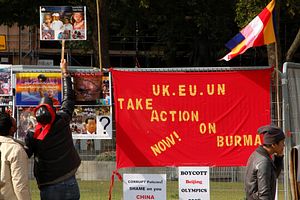Appealing business opportunities are hard to resist and, as a European diplomat said, reputational risks for companies investing in Myanmar are decreasing. Determined to establish good relations with Myanmar’s former generals, essential for investment, European governments now focus on providing them with encouragement and support.
To show it is still committed to improving the human rights situation in Myanmar, the EU initiated a human rights dialogue with the government in May this year.
“Our objective is to support and accompany Myanmar in the transition process. We believe that this can be done more effectively through engagement and support than continued sanctions,” said Colin Steinbach, spokesperson for the European Union in Myanmar.
But civil society groups have questioned whether superficial reforms have been rewarded at the risk of reinforcing the old, authoritarian power structures. They are calling for more pressure on the government to step up reforms.
The yardsticks for human rights dialogue are similar to the benchmarks set by the EU in 2012 for the permanent lifting of sanctions against Myanmar. These were then neglected the following year to reward the government for the “remarkable changes” it had made.
One of these benchmarks was the unconditional release of all political prisoners, once a strong advocacy point for the EU. Contrary to its promise, the Myanmar government has quietly returned to its old habit of arresting political dissidents, including journalists, while the EU continues to hand out rewards.
Not included in the benchmarks for the human rights dialogue is the inhumane treatment inflicted on the Rohingya, a mainly Muslim ethnic minority that is denied citizenship and freedom of movement.
“The EU has given too much. They give the government more legitimacy which they can then use to oppress the people,” said Bo Kyi, Joint Secretary of the Assistance Association for Political Prisoners.
After years of punitive measures against Myanmar’s generals, European governments now favor the carrot over the stick. With a massive potential for investment in Asia’s “last frontier economy,” Europe has toned down its advocacy for human rights in a competition to win over the country’s quasi-civilian rulers.
Myanmar’s reforms are often measured against the practices of dictatorial times and, compared with the relentless oppression of the past, the reformist generals come off well. Unimaginable only a few years ago, solving the country’s civil war was made a priority, press freedom did improve significantly, and many political prisoners were released in amnesties. On closer inspection, however, the reforms appear to lack the depth needed for the development of a democratic union, and power remains with the army.
One reason critics warn about the EU’s current policy on Myanmar is that the country’s most powerful player, the military, still retains its position despite a formal handover of power to a quasi-civilian government three years ago. The special position of the military is secured in the controversial 2008 constitution. “In this current structure the whole country is ruled by the military chief, not the president,” said Ko Ni, legal advisor for the main opposition party, the National League for Democracy.
Significant power is also vested in the bureaucracy, which consists mainly of former military officials in civilian clothes and civilians appointed under preferential treatment. These officials have acted with impunity under decades of military rule and often lack the willingness, as well as the knowledge, to act in accordance with new laws and regulations.
Even people working for the government with the Myanmar Peace Center, an institution heavily funded by the EU, are now voicing their disappointment in the lack of administrative reform on the ground. “The military is not just in power at the state level, but all the way down to the township level,” said Andrew Ngun Cung Lian, legal advisor to the Myanmar Peace Center. “We need to replace the bureaucrats.”
The courts also lack independence and fail to protect citizens against unjust treatment by the government. Conflicts over land grabbing by the military and its cronies, one of the main causes of unrest in the country, have thus little chance of being settled fairly in court.
The ease with which the military still flouts its superiority over the law today raises deep concerns about its willingness to relinquish power. While some countries have warned the Myanmar government, it remains unclear what kinds of “sticks” the EU or its member states are willing to use to deter the former generals from backtracking on reforms.
Until now, even the ongoing war in Myanmar’s northern Kachin state, the abysmal living conditions of the Rohingya in displaced peoples camps, and the expulsion of aid groups from conflict-ridden Rakhine state have not led to changes in European policy towards Myanmar.
“We do not make policies based on “if,” yet France is very vigilant regarding all the aspects of democratization and the peace process in Myanmar,” said Thierry Mathou, French ambassador to Myanmar. Spokespersons from other European embassies in Yangon gave similar answers.
As long as the foundations of military rule remain in place, the large EU funds flowing into Myanmar carry the heavy risk of supporting authoritarianism, instead of democracy. “The process of closer partnership should be frozen, along with all programs building government capacity except for health and education,” said Mark Farmaner, director of the Burma Campaign UK. “EU aid should not be used to help build a more modern and efficient authoritarian government.”
Yola Verbruggen is an independent Dutch journalist and political analyst living in Myanmar.

































